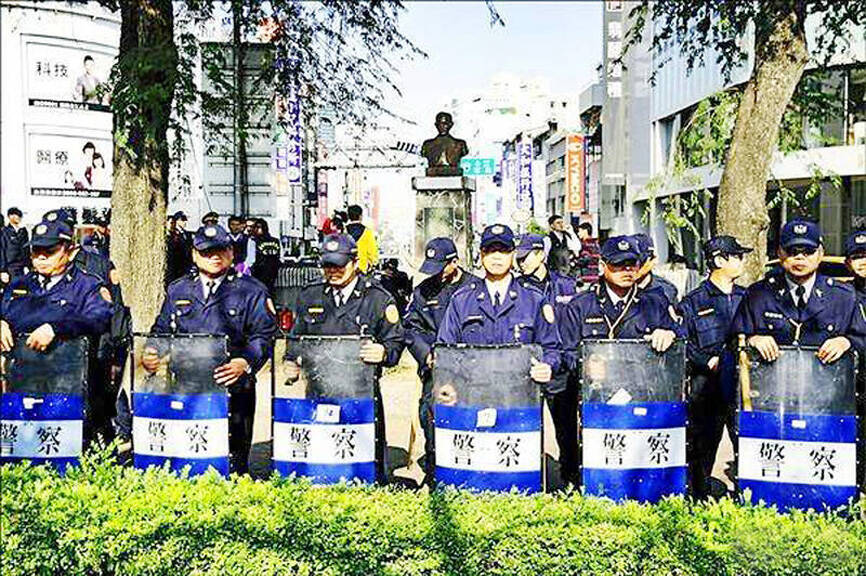The Executive Yuan said it would request a revote from lawmakers on a bill passed in January that effectively raises retirement pensions for police officers, firefighters and other members of law enforcement and the emergency services.
Premier Cho Jung-tai (卓榮泰) in a statement yesterday said that the Cabinet would, pending President William Lai’s (賴清德) approval, ask the legislature to hold a revote on the amendments to the Police Personnel Management Act (警察人員人事條例) to overturn the legislation it regards as “difficult to implement.”
The amendments include measures raising the income replacement rate for retired police officers, firefighters, immigration officers, and personnel in the Coast Guard Administration and the National Air Service Corps to as much as 80 percent.

Photo: Taipei Times
The amendments, supported by lawmakers from the opposition Chinese Nationalist Party (KMT) and Taiwan People’s Party, would be applied retroactively.
Currently, the pension plans for law enforcement and emergency services personnel are the same as other public servants, with the cap on the income replacement rate set to gradually decrease to 60 percent by 2029.
Although the amendments were adopted on Jan. 7, the legislature did not announce them until Monday last week.
The measures would “impact the financial stability” of the public service pension system, undermine its fairness, and subsequently affect the rights of acting and retired public servants, the Cabinet said.
Opposition lawmakers failed to consult with the executive body before pushing through the measures that would greatly increase government spending and contravened Article 91 of the Budget Act (預算法), it said.
The article stipulates that “legislators shall seek comments from the Executive Yuan and point out sources of complement funds” if they “propose bills that largely increase annual expenditures or decrease annual revenues.”
The government had provided additional benefits to members of law enforcement and the emergency services on account of their unique work environments and workload, Cho said.
The Cabinet request was made in accordance with the Constitution, which states that the executive body can — with the president’s approval — request a legislative revote on legislation lawmakers have passed if it considers such a law “difficult to implement,” he said.
The pension plans for law enforcement and emergency services personnel should be adjusted to levels comparable to those of the armed forces, opposition lawmakers said, citing the high pressure they face due to high-risk duties, and long and rotating work hours.
Some sections of the police force are required to carry out “military training,” so they can be deployed to protect power plants, science parks and other critical infrastructure during times of war, they said.
The Ministry of Civil Service has said that the measures would increase the financial burden facing the public service pension system, which is strained by decreased revenue.
The ministry said that the system is expected to have an estimated shortfall of NT$170 billion (US$5.12 billion) over the next 50 years, and that this amount would eventually fall on all taxpayers.

‘DENIAL DEFENSE’: The US would increase its military presence with uncrewed ships, and submarines, while boosting defense in the Indo-Pacific, a Pete Hegseth memo said The US is reorienting its military strategy to focus primarily on deterring a potential Chinese invasion of Taiwan, a memo signed by US Secretary of Defense Pete Hegseth showed. The memo also called on Taiwan to increase its defense spending. The document, known as the “Interim National Defense Strategic Guidance,” was distributed this month and detailed the national defense plans of US President Donald Trump’s administration, an article in the Washington Post said on Saturday. It outlines how the US can prepare for a potential war with China and defend itself from threats in the “near abroad,” including Greenland and the Panama

A wild live dugong was found in Taiwan for the first time in 88 years, after it was accidentally caught by a fisher’s net on Tuesday in Yilan County’s Fenniaolin (粉鳥林). This is the first sighting of the species in Taiwan since 1937, having already been considered “extinct” in the country and considered as “vulnerable” by the International Union for Conservation of Nature. A fisher surnamed Chen (陳) went to Fenniaolin to collect the fish in his netting, but instead caught a 3m long, 500kg dugong. The fisher released the animal back into the wild, not realizing it was an endangered species at

The High Prosecutors’ Office yesterday withdrew an appeal against the acquittal of a former bank manager 22 years after his death, marking Taiwan’s first instance of prosecutors rendering posthumous justice to a wrongfully convicted defendant. Chu Ching-en (諸慶恩) — formerly a manager at the Taipei branch of BNP Paribas — was in 1999 accused by Weng Mao-chung (翁茂鍾), then-president of Chia Her Industrial Co, of forging a request for a fixed deposit of US$10 million by I-Hwa Industrial Co, a subsidiary of Chia Her, which was used as collateral. Chu was ruled not guilty in the first trial, but was found guilty

DEADLOCK: As the commission is unable to forum a quorum to review license renewal applications, the channel operators are not at fault and can air past their license date The National Communications Commission (NCC) yesterday said that the Public Television Service (PTS) and 36 other television and radio broadcasters could continue airing, despite the commission’s inability to meet a quorum to review their license renewal applications. The licenses of PTS and the other channels are set to expire between this month and June. The National Communications Commission Organization Act (國家通訊傳播委員會組織法) stipulates that the commission must meet the mandated quorum of four to hold a valid meeting. The seven-member commission currently has only three commissioners. “We have informed the channel operators of the progress we have made in reviewing their license renewal applications, and